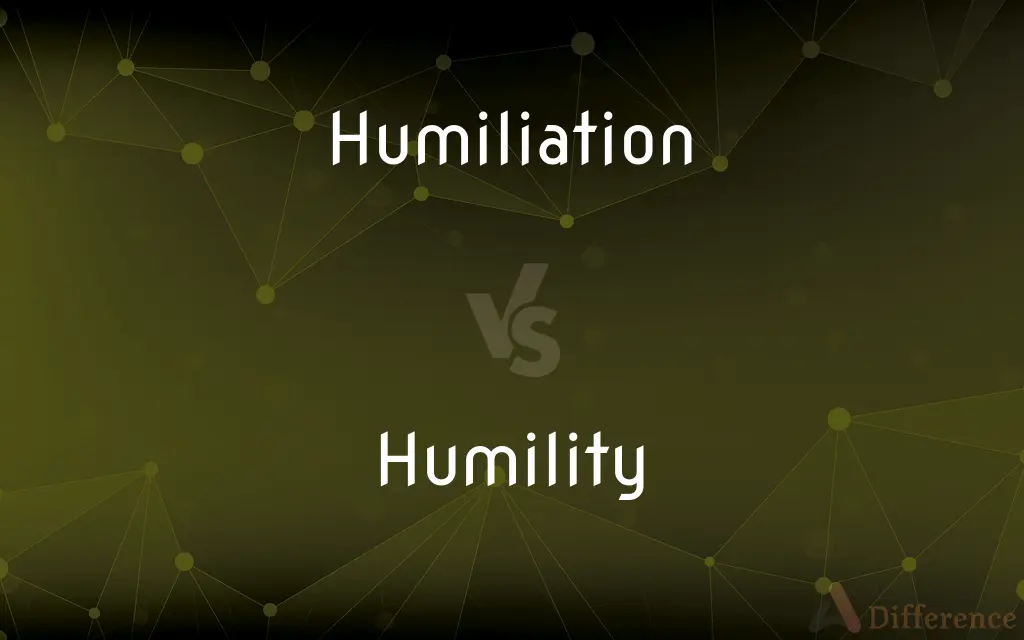Humiliation vs. Humility — What's the Difference?
By Maham Liaqat & Fiza Rafique — Updated on April 29, 2024
Humiliation involves embarrassment and a loss of dignity often inflicted by others, whereas humility is a personal quality of being modest and respectful.

Difference Between Humiliation and Humility
Table of Contents
ADVERTISEMENT
Key Differences
Humiliation is the feeling of shame or embarrassment, typically resulting from being degraded by others or through a demeaning experience. On the other hand, humility is a character trait that involves recognizing one's limitations and showing respect for others without seeking superiority.
Humiliation often decreases a person's self-esteem and can be emotionally painful, as it involves a loss of dignity and respect in the eyes of others. Whereas, humility is generally viewed positively, as it enhances one's relationships and is associated with self-awareness and emotional strength.
People experience humiliation as a result of external factors, such as criticism, mockery, or failure in a public setting. Meanwhile, humility is internally cultivated and involves an understanding and acceptance of one's flaws and strengths without needing external validation.
While humiliation can lead to resentment, social withdrawal, or even aggression in response to feeling demeaned, humility can foster cooperation, empathy, and effective communication within a group setting.
Humiliation is often used as a tool for power or control, where one individual or group seeks to lower the status of another. In contrast, humility is associated with equality and the voluntary acknowledgment of not being superior to others.
ADVERTISEMENT
Comparison Chart
Source
External (others' actions or situations)
Internal (self-perception and values)
Emotional Impact
Negative (shame, loss of dignity)
Positive (self-awareness, respect)
Relationship with Self-Esteem
Lowers self-esteem
Compatible with high self-esteem
Social Effect
Can lead to isolation and resentment
Promotes cooperation and empathy
Function in Power Dynamics
Often used to exert control or demean
Involves acknowledging equality
Compare with Definitions
Humiliation
The result of an action intended to lower someone's dignity.
The judge's harsh comments added to the defendant's humiliation.
Humility
Promotes social harmony and self-awareness.
His humility in acknowledging his mistake smoothed over the potential conflict.
Humiliation
A state of disgrace or loss of self-respect.
Her humiliation was complete when the photos were shared online.
Humility
The quality of being respectfully modest.
Despite her achievements, she approached every conversation with humility.
Humiliation
Emotional suffering linked to public embarrassment.
The humiliation of being fired in such a public manner lingered for years.
Humility
A modest view of one's own importance; humbleness.
His humility was evident when he credited his team for the success.
Humiliation
Often associated with feelings of being demeaned or insulted.
She experienced profound humiliation after being mocked by her peers.
Humility
Reflects a lack of arrogance or pretense.
He carried his accolades with humility, never boasting about his accomplishments.
Humiliation
The act of making someone feel ashamed or foolish, often publicly.
He felt humiliation when his mistake was pointed out in front of the entire class.
Humility
A characteristic that fosters learning and listening.
Her humility made her a beloved leader, as she always valued others' opinions.
Humiliation
Humiliation is the abasement of pride, which creates mortification or leads to a state of being humbled or reduced to lowliness or submission. It is an emotion felt by a person whose social status, either by force or willingly, has just decreased.
Humility
Humility is the quality of being humble. Dictionary definitions accentuate humility as a low self-regard and sense of unworthiness.
Humiliation
The act of humiliating; degradation.
Humility
The quality or condition of being humble.
Humiliation
The state of being humiliated or disgraced; shame.
Humility
The characteristic of being humble; humbleness in character and behavior.
Humiliation
A humiliating condition or circumstance.
Humility
The state or quality of being humble; freedom from pride and arrogance; lowliness of mind; a modest estimate of one's own worth; a sense of one's own unworthiness through imperfection and sinfulness; self-abasement; humbleness.
Serving the Lord with all humility of mind.
Humiliation
The act of humiliating or humbling someone; abasement of pride; mortification.
Humility
An act of submission or courtesy.
With these humilities they satisfied the young king.
Humiliation
The state of being humiliated, humbled or reduced to lowliness or submission.
Humility
A disposition to be humble; a lack of false pride;
Not everyone regards humility as a virtue
Humiliation
The act of humiliating or humbling; abasement of pride; mortification.
Humility
A humble feeling;
He was filled with humility at the sight of the Pope
Humiliation
The state of being humiliated, humbled, or reduced to lowliness or submission.
The former was a humiliation of Deity; the latter a humiliation of manhood.
Humiliation
State of disgrace or loss of self-respect
Humiliation
Strong feelings of embarrassment
Humiliation
An instance in which you are caused to lose your prestige or self-respect;
He had to undergo one humiliation after another
Humiliation
Depriving one of self-esteem
Common Curiosities
Why is humility considered a virtue?
Humility is considered a virtue because it involves recognizing one's limitations and valuing others, contributing to better interpersonal relationships and personal integrity.
What is the key emotional consequence of humiliation?
Humiliation typically results in feelings of shame, embarrassment, and decreased self-esteem.
How can one cope with feelings of humiliation?
Coping with humiliation can involve seeking support, practicing self-compassion, and developing resilience to overcome negative feelings.
Can humiliation have any positive effects?
While often painful, humiliation can sometimes lead to personal growth if it leads to self-reflection and change.
How does humility affect personal relationships?
Humility generally enhances personal relationships by fostering respect, empathy, and understanding.
Can humility be misconstrued in a competitive environment?
In highly competitive environments, humility might sometimes be misconstrued as a lack of ambition or assertiveness.
How can someone develop humility?
Developing humility can involve practices like mindfulness, self-reflection, acknowledging others' contributions, and focusing on personal growth rather than external validation.
Is humility a sign of weakness?
Contrary to some perceptions, humility is not a sign of weakness but a strength that demonstrates self-confidence and self-awareness.
What are the social impacts of humiliation?
Socially, humiliation can lead to alienation, resentment, and even conflict, as it damages relationships and personal dignity.
What differentiates humility from low self-esteem?
Humility is a positive quality involving a realistic assessment of one's abilities and shortcomings, unlike low self-esteem, which is characterized by a lack of confidence in one's worth.
What role does humility play in leadership?
In leadership, humility can lead to more democratic and inclusive decision-making processes, fostering team loyalty and effectiveness.
What are some historical examples where humiliation played a significant role?
Historical examples include political or military defeats that have led to national humiliation and subsequent calls for reform or revenge.
How can organizations prevent humiliation?
Organizations can prevent humiliation by fostering a culture of respect, implementing fair practices, and addressing power imbalances.
Is there a cultural aspect to how humiliation and humility are perceived?
Yes, cultural values can significantly influence the perception and value placed on humiliation and humility.
Can humility be learned from experiences of humiliation?
Yes, experiencing humiliation can sometimes lead to the development of humility if the experiences are reflected upon constructively.
Share Your Discovery

Previous Comparison
Coordinator vs. Moderator
Next Comparison
Provably vs. ProbablyAuthor Spotlight
Written by
Maham LiaqatCo-written by
Fiza RafiqueFiza Rafique is a skilled content writer at AskDifference.com, where she meticulously refines and enhances written pieces. Drawing from her vast editorial expertise, Fiza ensures clarity, accuracy, and precision in every article. Passionate about language, she continually seeks to elevate the quality of content for readers worldwide.













































